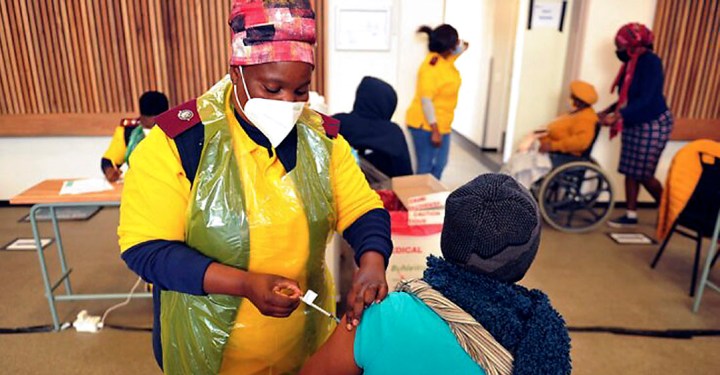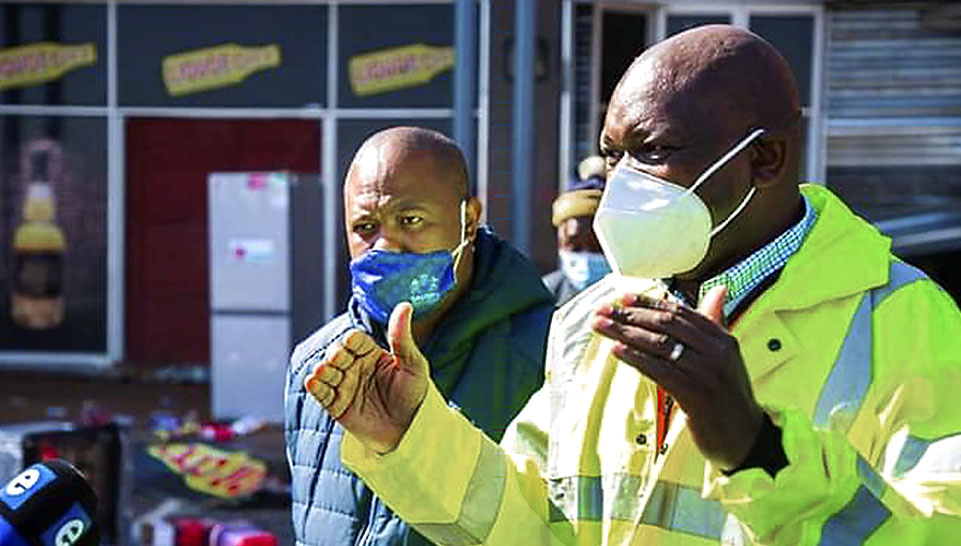SPOTLIGHT
Gauteng hospitals under strain as third wave continues

Hospitals in Gauteng are buckling under the strain of third wave Covid-19 infections, which, combined with unrest in the province, makes for a grim picture.
As the third wave of Covid-19 infections continues in Gauteng, hospitals remain under severe strain. Gauteng Premier David Makhura this week said hospital admissions continue to rise and are placing “a heavy strain on the healthcare system in both public and private sectors”. While signs are that infections have peaked in the province, admissions and deaths have not — the latter two typically peak a few weeks later than infections.
Add to this the ongoing unrest in certain areas in Gauteng, and it makes for a very grim picture.

Premier David Makhura said this week that many vaccination sites in the affected areas had to temporarily close for safety concerns. (Photo: GP Health)
Makhura this week said that many vaccination sites were affected and had “to temporarily close due to safety concerns by both the staff and members of the public”. The Emergency Medical Services (EMS) have limited access, making it difficult to respond to distress calls in communities.
On Wednesday, the grounds of Africa’s biggest hospital, Chris Hani Baragwanath, were patrolled by soldiers carrying rifles to protect the premises against looters.
‘This is a deadly wave’
Dr Kaboyi Wa Matamba, an occupational medical practitioner at Thelle Mogoerane Academic Hospital, tells Spotlight they face many challenges.
“The second wave was quite manageable. This one [third wave] is big.” He says that on 4 July the hospital tested 23 Covid-positive patients in the emergency department and they had to put them in regular wards. He says wards are full and even the PUI (person under investigation) area is full.
“It’s full everywhere, and the third wave is bad; if people are not taking care or social distancing, wearing the mask, avoiding the overcrowding, it’s just going to eat us badly. This is a deadly wave.”
Wa Matamba says that his target is to vaccinate 500 people per day, but this has been difficult in the past few days as most of the nurses had to assist in the hospital.
“Before, I had at least 18 nurses on the site to occupy 20 stations,” he says, adding that it is easy to reach the target with an adequate number of staff members.
“There is one day I remember, we did around 450 [vaccinations], so we can easily get the target of 500 when we have a team of 20. But now I’ve got 10, which is completely short, and I’m running eight stations,” he says. This means the team has to work into the night because patients cannot be sent back home as they are already at the vaccination site.
Wa Matamba says they raised the issue of staff shortages with the district and, “They say that there are doctors and nurses that have been employed but they will only be operational by August. It means that in July we have to work with the limited resources we have. But the good news is those [nursing] sisters trained as vaccinators can come and we can motivate for the overtime for them.”
Snapshot of Ekurhuleni hospitals during the third wave
Spotlight sent questions to various hospitals in Ekurhuleni and the responses we received were signed off by Gauteng Department of Health spokesperson Kwara Kekana.
- Thelle Mogoerane Hospital
Wards at Thelle Mogoerane Regional Hospital are repurposed as and when required, says Kekana.
“When the number of patients increases we repurpose general wards to accommodate them. Currently, we have had a rapid rise in Covid and PUI patients, but the number of non-Covid patients requiring admission is still high.” This resulted in the hospital limiting admissions of non-Covid patients to emergency cases only. Kekana says all elective cases will be reviewed after the third wave has subsided.
“We have created 202 Covid-19/PUI beds which are used to accommodate paediatrics, adults, psychiatric, maternity, and critical-care patients. Currently, we struggle to accommodate Covid-19 positive adult patients and Covid-19 positive critical care patients,” she says.
The hospital, like several others, needs more staff and PPE for healthcare workers.
- Tembisa Hospital
Overcrowding is a problem at Tembisa Hospital, says Kekana. “There is congestion in the accidents and emergency unit. The unit is the entry point for all emergencies. Currently, it is also used for isolation of patients who come in as patients under investigation.”
The wards are also full of both Covid and non-Covid patients who need admission. “Some patients are admitted in tents. Wards identified for treating Covid patients also need to have donning and doffing areas,” Kekana explains.
She says Tembisa Hospital is experiencing staff shortages as patient numbers increase and staff members testing positive for Covid-19 have to be isolated.
“Most of the patients who get admitted need to be put on oxygen. This is a challenge as some of the wards don’t have piped oxygen and the hospital, therefore, relies on cylinders,” Kekana says.
The hospital does not have the capacity to handle all the patients at the moment, and staff members who are willing to do overtime have been requested to do so. Management at Tembisa Hospital indicated they need the government to create contract posts for all categories and they need facilities to isolate patients who do not need oxygen but cannot isolate at home.
Gauteng MEC for Health Dr Nomathemba Mokgethi earlier vowed to appoint more staff to complement the 5,521 Covid-19 posts filled by 1 June.
- Pholosong Hospital
Pholosong Hospital has been more fortunate since it could create additional wards for the care of Covid-19 patients. The biggest challenge, however, is procuring physical beds for these new wards because suppliers were not prioritising regional and smaller hospitals during the pandemic.
“We’ve had to increase our Covid-19 beds by almost 50% since the start of the resurgence. On average over the last two weeks we have had a bed utilisation of over 90% and have moved to swiftly de-escalate other non-emergency services,” Kekana says.
Pholosong has historical shortages that have been exacerbated by the resurgence of the pandemic. “We currently rely on the use of overtime, Covid-19 contract posts, and sessional posts to limit the risk of staff shortage,” Kekana says.
- Far East Rand Hospital
Far East Rand Hospital has designated wards to admit Covid-19 positive patients and PUIs. It has four wards dedicated to Covid-19 patients. All elective (non-emergency) operations have been suspended.
“We can confirm that the hospital is overstrained; however, we have requested overtime and more human resources to ensure continued excellent patient care.”
Hospital management made it clear they need personal protective equipment (PPE), additional staff, including doctors, nurses, cleaners and porters, and extra oxygen capacity.
Spotlight asked Kekana how the provincial department intends to address the concerns raised by the management of the various hospitals and she responded, “Hospitals have managers who are tasked with solutions to problems.”
East Rand clinics struggle
Meanwhile, some clinics in Ekurhuleni are also taking strain. A staff member from Daveyton East Clinic who asked to remain anonymous, tells Spotlight that their challenge is that many nurses have been testing positive for Covid-19 in the past two weeks. She says that despite this the clinic is trying to continue providing services to the community as normal but it becomes difficult when healthcare workers have to go into isolation.
According to the provincial department’s figures, 126,982 healthcare workers have been vaccinated in the province.
“Another thing,” the staff member says, “is that we only have one person doing the Covid-19 testing, and he sees about 30 to 50 patients per day, which is too much for him. He doesn’t have an assistant. The district hasn’t provided one yet.”
According to the Gauteng Community Health Care Forum, most clinics in Gauteng are short of testing kits and are turning patients away in the middle of the third wave. The forum says there has been no mass screening and testing in the communities.

Amid ongoing unrest in certain areas in Gauteng, South African National Defence Force soldiers were deployed to guard malls and hospitals such as Chris Hani Baragwanath Academic Hospital. (Photo: Elmond Jiyane / GCIS)
Speaking to Spotlight, a member of the forum, who asked to remain anonymous, says that community healthcare workers only help with registration.
“Initially we were told that we were going to assist at the vaccine sites, but it hasn’t happened,” she says, adding that the only thing community healthcare workers do at vaccination sites is to help with queues and sanitising people.
She says that there are many challenges with the vaccination process. “For those who are bedridden and those who cannot walk it’s still a challenge because there is no transportation for them to the venues. The department has not responded to us on what to tell the people who cannot get to the vaccination sites,” she says.
“The online registration doesn’t ask if the person can walk or not, which I think really needs to be fixed.”
She says community health workers (CHWs) in clinics still struggle to get PPE. She says many clinics don’t have masks and sanitisers.
“I would say we are not considered, but the department is using us as soldiers because we are the ones who go deep into the communities and dig out these cases, but at the same time we are always running out of test kits.”
Kekana says community health workers have been briefed on how to educate and encourage older people to vaccinate.
“CHWs do education on Covid-19, promote adherence to non-pharmaceutical interventions, proper washing of hands, sanitising and social distancing, [urging people] to avoid attending events they can avoid, including funerals.” They also help with screening, Kekana says. DM/MC
This article was produced by Spotlight — health journalism in the public interest.
"Information pertaining to Covid-19, vaccines, how to control the spread of the virus and potential treatments is ever-changing. Under the South African Disaster Management Act Regulation 11(5)(c) it is prohibited to publish information through any medium with the intention to deceive people on government measures to address COVID-19. We are therefore disabling the comment section on this article in order to protect both the commenting member and ourselves from potential liability. Should you have additional information that you think we should know, please email [email protected]"




